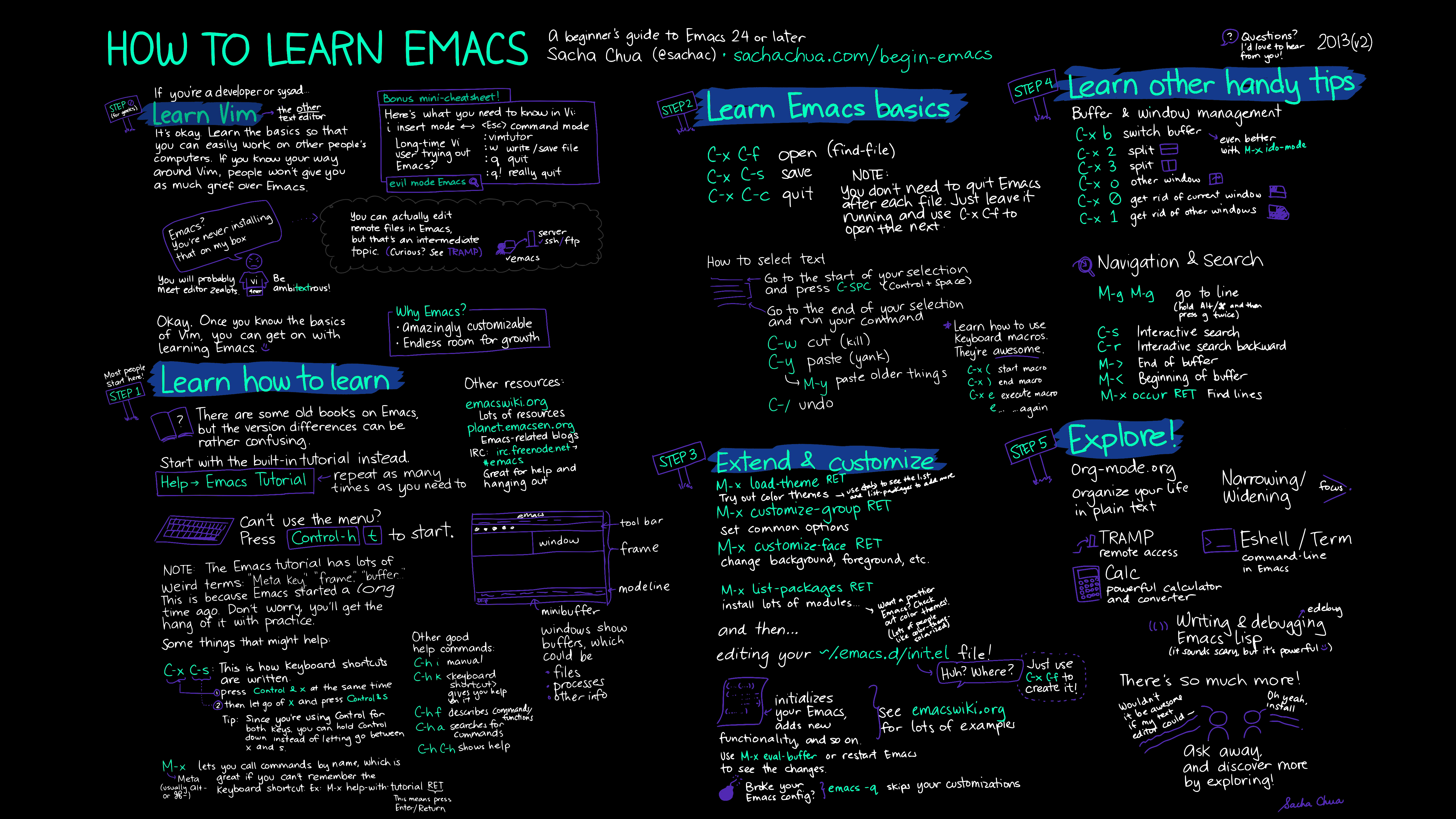I figure I would share this one more time. The thing is so handy I put it on my desktop but the original is blinding white and 1.5:1 aspect ratio. This is a quick recolor and resize to 16:9. There is a 90px margin on top that is sized for the GNOME header so that the content remains visible. Sorry if this post seems redundant. For me, having this reminder to keep trying to use Emacs is just the motivation I need to open a file in Emacs instead of just using gedit quickly.
::: spoiler bonus tip!
On Fedora 40, if you have darkmode set to the default in GNOME, GNU Emacs does not follow the darkmode styling directive for the menu bar. I spent forever trying to make this work in darkmode. If the app is launched using $ GTK_THEME=Adwaita:dark emacs it will start with the menu bar set to dark mode.
However there is a script that actually launches Emacs in /user/bin/emacs-desktop. If you open that file and modify it by adding export GTK_THEME=Adwaita:dark emacs just before the last line, it will launch with darkmode enabled. This is the entire contents of that file:
#!/usr/bin/sh
# The pure GTK build of emacs is not supported on X11, so try to avoid
# using if there is an alternative.
if [ "$XDG_SESSION_TYPE" = 'x11' ]; then
case "$(readlink -f /usr/bin/emacs)" in
*/emacs-*.*-pgtk)
if type emacs-gtk+x11 >/dev/null; then
exec emacs-gtk+x11 "$@"
elif type emacs-lucid >/dev/null; then
exec emacs-lucid "$@"
fi
;;
esac
fi
export GTK_THEME=Adwaita:dark emacs
exec emacs "$@"
I'm not claiming it is the right way. It just worked when I tried it.

Are there any benefits in switching to emacs (or vim?) for casual "power users"? I mean, I do a lot of editing with nano over ssh from a linux desktop or macOS and I get mostly frustrated over shortcuts while editing configuration files and tiny easy to use bash scripts.
I already had the cognitive dissonance if I should learn either emacs or vim to improve editing speed, but still nano fullfills all my needs :/.
Seeing your post, raises the same question again. Care to give some personal experience?
Thanks !
Editing speed is generally not all that significant in my experience. Actual editing is a small fraction of most work IME as a coder and even more when administrating etc..
Exploring, researching, organizing, executing, debugging, monitoring etc is what most people spend most of their time doing. For actual editing all editors work pretty well.
Emacs is a text manipulation environment that includes some editors (including vim if you want) that can be very productive in the long run for all of your activities, not just editing, in a coherent integrated manner. Most things boil down to text after all. But takes significant time to ramp up with and get to rich fluidity. It's an environment that you program and mold to your needs over time.
I just reached 30 years with it of continuous improvement and related rewards. There is nothing similar out there.
Thanks for your input :))).
Understood. I'm just doing some light editing on my server mostly doing some text editing here an there (docker files, system files, some bash...) and I really got confused about IDE, terminals, shells and text editing. While emacs looks like a very neat and advanced tool in IT, right now it's probably overkill for my use case (keeping my services and mini homelab server alive XD).
I got a Mac as birthday gift (ughhh I hate it somehow...), but I couldn't find a good workflow between my server (running debian) and Desktop (running endeavour). That's where I got confused somehow, because shortcuts between devices are completely out of sync even for minimal text editing. (also that shell terminals ≠ text editor)
However, I found a good compromise today: iTerm2 + micro on my mac. It's probably a step-up from nano and has better integration with this stupid mac !
Thank you :)
As an Emacs user my typical mode for dealing with server files is to edit them remotely from my local emacs, not using an editor on the server.
But the commitment required to adopt Emacs isn't to be underestimated.